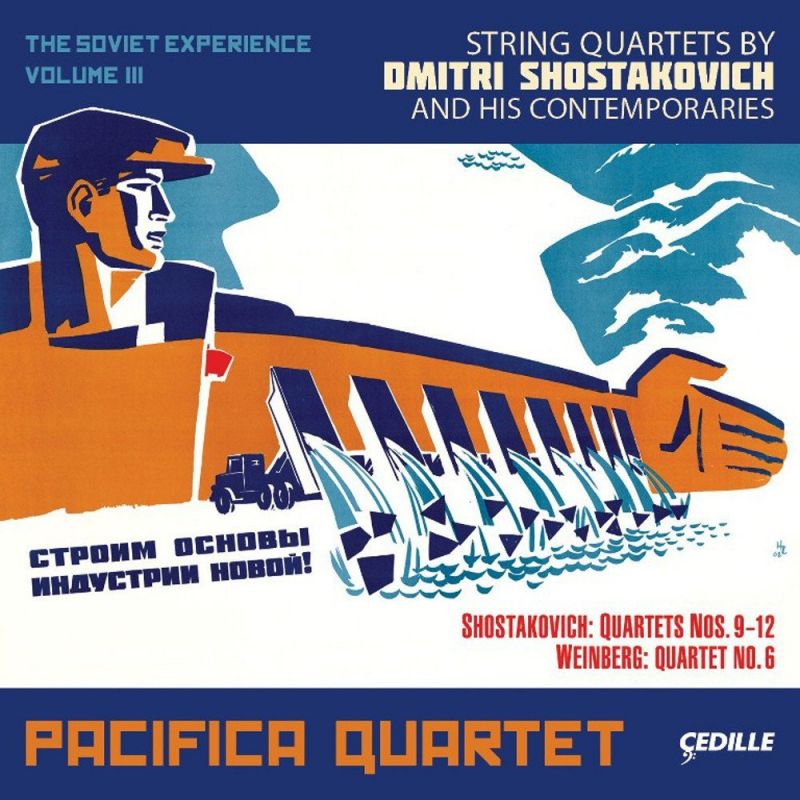SHOSTAKOVICH String quartets Nos 9-12
Weinberg joins the the Pacifica Quartet’s Soviet pairing project
View record and artist detailsRecord and Artist Details
Composer or Director: Mieczyslaw Weinberg, Dmitri Shostakovich
Genre:
Chamber
Label: Cedille
Magazine Review Date: 08/2013
Media Format: CD or Download
Media Runtime: 128
Mastering:
DDD
Catalogue Number: CDR90000 138

Tracks:
| Composition | Artist Credit |
|---|---|
| String Quartet No. 9 |
Dmitri Shostakovich, Composer
Dmitri Shostakovich, Composer Pacifica Quartet |
| String Quartet No. 10 |
Dmitri Shostakovich, Composer
Dmitri Shostakovich, Composer Pacifica Quartet |
| String Quartet No. 11 |
Dmitri Shostakovich, Composer
Dmitri Shostakovich, Composer Pacifica Quartet |
| String Quartet No. 12 |
Dmitri Shostakovich, Composer
Dmitri Shostakovich, Composer Pacifica Quartet |
| String Quartet No 6 |
Mieczyslaw Weinberg, Composer
Mieczyslaw Weinberg, Composer Pacifica Quartet |
Author: IMarch
The Ninth Quartet has five movements, contrasting the wittily disquieting pizzicato of the opening with a profound Adagio, dancing Allegretto and something of a maelstrom in the finale. In No 10 the first movement is gently paced, all but charming, with striking sul ponticello triplets on the viola hinting at an almost sinister intrusion. The following Allegretto furioso makes an angry response but this is dissipated in the lamenting yet serene passacaglia slow movement, and the strangeness of atmosphere permeates the Allegretto finale, which recalls earlier themes.
The Eleventh Quartet is the largest in scale with (appropriately) 11 movements vying with each other for attention, with a motto theme that first emerges in the opening movement and resurfaces periodically throughout the work, which ends pensively. The cello opens the two-movement Twelfth Quartet with a theme that features all 12 notes of the chromatic scale without repetition. As the booklet-note suggests, ‘the two movements clearly present a journey from torpor to assertiveness – a return to creative vigour’.
Weinberg’s six-movement Sixth Quartet is rewardingly individual but altogether more conventional. The opening Allegro semplice is essentially a lyrical if unpredictable dance movement of some charm and considerable warmth. This leads to a lively, concentrated Presto agitato all but joined to a brief, pungent Allegro con fuoco which ends pianissimo and prepares the way for an elegiac Adagio, opening in a serene fugue. The following Moderato comodo, which closes ethereally, leads to a surprising finale marked Andante maestoso, with strongly consistent forward movement and energy and bursts of dissonant interplay. But the work ends positively and satisfyingly, and I enjoyed it as a contrast to the Shostakovich quartets. The recording is vivid and well balanced throughout the two discs, and there are good (and necessary) notes by David Fanning.
Discover the world's largest classical music catalogue with Presto Music.

Gramophone Digital Club
- Digital Edition
- Digital Archive
- Reviews Database
- Full website access
From £8.75 / month
Subscribe
Gramophone Full Club
- Print Edition
- Digital Edition
- Digital Archive
- Reviews Database
- Full website access
From £11.00 / month
Subscribe
If you are a library, university or other organisation that would be interested in an institutional subscription to Gramophone please click here for further information.




